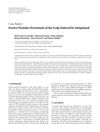January 2001 in “대한피부과학회지” Minipulse therapy with betamethasone effectively promotes hair regrowth in alopecia areata with fewer side effects.
 3 citations,
February 2021 in “Molecules”
3 citations,
February 2021 in “Molecules” A new method was created to test the effectiveness of Dihydrotestosterone (DHT) inhibitors, like finasteride and dutasteride, in human and fish cells. The results showed fish cells are more sensitive to these treatments, and dutasteride works better than finasteride in all tested cells.
 4 citations,
January 2016 in “Dermatology practical & conceptual”
4 citations,
January 2016 in “Dermatology practical & conceptual” A man developed a rare skin condition after a hair transplant surgery.
33 citations,
March 1996 in “Veterinary Quarterly” Amitraz effectively treated ferrets with demodicosis without side effects.
1 citations,
February 2023 in “International Journal of Rheumatic Diseases” TB can mimic SLE symptoms, so doctors should consider TB in such cases.
3 citations,
May 2022 in “Clinical endocrinology” Hair steroid measurement is an effective method to diagnose and monitor CAH in developing countries.
April 2019 in “Journal of the Endocrine Society” Using LC-MS/MS for hormone measurement can prevent false high testosterone results and avoid unnecessary tests.
 30 citations,
October 2020 in “Nature Communications”
30 citations,
October 2020 in “Nature Communications” Finasteride irreversibly affects human steroid 5α-reductase 2, providing insight into its catalytic mechanism and disease-related mutations.
4 citations,
March 2019 in “JAT. Journal of applied toxicology/Journal of applied toxicology” PFOS exposure disrupts hormone levels and enzyme activities in juvenile frogs, affecting males and females differently.
 7 citations,
October 2019 in “Case reports in endocrinology”
7 citations,
October 2019 in “Case reports in endocrinology” A young woman's symptoms suggested PCOS, but tests and surgery confirmed and treated a rare ovarian tumor, resolving her condition.
 January 2023 in “Seven Editora eBooks”
January 2023 in “Seven Editora eBooks” A rare ovarian tumor was diagnosed in a woman from North Brazil, and surgery is the preferred treatment.
 6 citations,
February 2020 in “Journal of Natural Products”
6 citations,
February 2020 in “Journal of Natural Products” A new compound from a sponge strongly inhibits an enzyme linked to male-pattern hair loss without being toxic at low levels.
 April 2019 in “Journal of the Endocrine Society”
April 2019 in “Journal of the Endocrine Society” The study found that imaging might miss small ovarian tumors causing high testosterone, and suggested using certain testosterone levels and treatment responses to identify these tumors.
 April 2023 in “Journal of Investigative Dermatology”
April 2023 in “Journal of Investigative Dermatology” Cryotherapy might help regrow hair in Alopecia Areata, but more consistent research is needed.
 17 citations,
August 2012 in “Archives of Pharmacal Research”
17 citations,
August 2012 in “Archives of Pharmacal Research” Acankoreoside J from Acanthopanax koreanum may help promote hair growth.
 451 citations,
March 2005 in “Endocrine Reviews”
451 citations,
March 2005 in “Endocrine Reviews” The enzyme steroid sulfatase is linked to breast cancer and other conditions, and inhibitors are being developed for treatment.
 April 2019 in “Journal of Investigative Dermatology”
April 2019 in “Journal of Investigative Dermatology” Lichen planopilaris involves disrupted fat metabolism, increased scarring, and mast cell activity.
 December 2023 in “Biointerface Research in Applied Chemistry”
December 2023 in “Biointerface Research in Applied Chemistry” Stiripentol shows promise as a potential treatment for androgen-related diseases but needs more testing.
 1 citations,
February 2022 in “bioRxiv (Cold Spring Harbor Laboratory)”
1 citations,
February 2022 in “bioRxiv (Cold Spring Harbor Laboratory)” Certain interactions help prepare the androgen receptor for pairing and activation, which is important for its role in development and disease.
1 citations,
September 2019 in “Journal of Investigative Dermatology” Anti-Desmocollin 3 antibodies can cause pemphigus-like symptoms in mice.
1 citations,
May 2021 in “Journal of the Endocrine Society” A woman developed Cushing syndrome and adrenal insufficiency from using fluticasone and ritonavir together.
 47 citations,
June 2014 in “Journal of Dermatological Treatment”
47 citations,
June 2014 in “Journal of Dermatological Treatment” Most treatments for lichen planopilaris were found to be generally unsatisfactory.
 November 2024 in “Cureus”
November 2024 in “Cureus” Early diagnosis and personalized treatment can prevent damage from dissecting cellulitis after hair restoration surgery.
 11 citations,
December 2018 in “Assay and Drug Development Technologies”
11 citations,
December 2018 in “Assay and Drug Development Technologies” Natural herbal compounds might treat certain medical conditions by reducing DHT levels, but more research is needed to confirm their effectiveness and safety.
 13 citations,
January 2012 in “Case reports in dermatological medicine”
13 citations,
January 2012 in “Case reports in dermatological medicine” An 84-year-old man got a rare scalp condition from using imiquimod cream, which was cured with systemic steroids.
 11 citations,
August 2012 in “Canadian journal of ophthalmology”
11 citations,
August 2012 in “Canadian journal of ophthalmology” Eyelash alopecia areata often goes undiagnosed and can lead to complete eyelash regrowth, especially in younger patients.
 7 citations,
January 2022 in “Plants”
7 citations,
January 2022 in “Plants” Rice husk and bran extracts from the Bue Bang 3 CMU variety can potentially treat hair loss due to their antioxidant, anti-inflammatory, and anti-androgenic properties.
 2 citations,
January 2022 in “Skin research and technology”
2 citations,
January 2022 in “Skin research and technology” OCT can detect hidden hair follicles in alopecia areata, indicating potential hair regrowth.
 February 2010 in “Journal of the American Academy of Dermatology”
February 2010 in “Journal of the American Academy of Dermatology” Umbilical cord blood transplantation improved the boy's symptoms despite complications.
 November 2024 in “PubMed”
November 2024 in “PubMed” Terbinafine can cause skin reactions when exposed to sunlight, so sun exposure should be avoided during treatment.





















